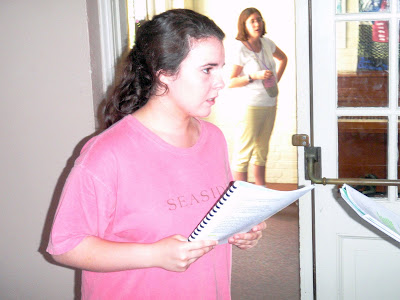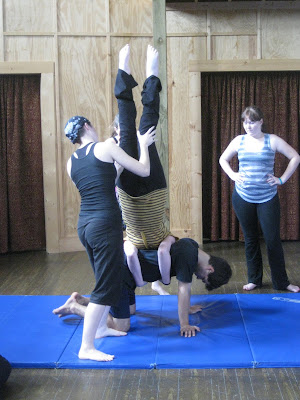Camp begins with passion and determination. From the first introductions in the late afternoon on Sunday, these campers show their eagerness to be a part of something larger than themselves. We all sat in a circle and introduced ourselves, said where we were from and why we came to this camp, or if we were returning, what brought us back. One camper said he kept coming back because each new session, each new lecture or workshop was “a quest in excellence.” Another said, “I am here because I absolutely love to learn, I absolutely love Shakespeare, and I absolutely love people pursuing their passion.”
Many campers are interested in not only performing language but in forming it, with an abundance of writers in the camp, one voicing herself, “I do poetry, or it does me.” One camper came because she is “attracted to the humanity of Shakespeare’s characters.” Many want to learn “the craft of performing,” and how best to express themselves.
Among the fleet, we have campers experienced in swing dance, tap dance, Irish dance, clogging, waltzing, modern, jazz and ballet, contra dance, square dance and belly dance, to say nothing of lacrosse, wrestling, fencing, soccer, ice-skating, gymnastics, rollerblading, hula hooping, and pogo-stick-jumping. One camper mentioned she didn’t do much, "only" juggling. When Emily, our fire-breathing-and-juggling counselor mentioned her latest item on her list of skills was blacksmithing, one of the campers called out, “Oh! Me too!” This group seems not only to profess an outstanding number of skills, but also an overwhelming aptitude and eagerness to learn. Even those regretting their lack of skills in a certain area don’t close off their options, saying not “I don’t play any instruments” but “I don’t play any instruments... yet.”
Doreen Bechtol, the camp co-director, mentioned that when we think about putting up plays in only three weeks, with so many other lectures and workshops and plans and ideas and activities, it seems impossible. But she went on to say that that shouldn’t worry us, because doing what’s impossible is what we are all about.
Sunday evening, the whole camp trouped over to the Blackfriars Playhouse to take a tour of the building and to get a feel for the space of the playhouse. When they began exploring the space, filling it with their presence, their voices, we learned that these campers bring much more than a long list of special skills. They bring an ability to listen, to give each other focus, and to share and take the stage in turn. Even the few lines they spoke were a teaser for yesterday morning's auditions where we saw even more of their generosity in performance.
The auditions in ASCTC always hold an active place in my heart, as in them I see so much potential. Auditions are a blend of workshop activities and the traditional recitation of 10 lines of text. Beginning with running up, taking the space in turn, and sharing their names once again, the campers then learned a short round sung to them by the counselors. Once they learned the music, they broke into groups of three (or in one case, five) and schemed up and rehearsed their own performance of that song. These performances are riveting: some musically striking, some with clever staging or strong character choices, some performed in dance.
After all these short performances, the counselors break the campers into three large groups and give them ten lines of text from one of the three plays they'll be performing:
A Midsummer Night’s Dream,
Troilus and Cressida, or Christopher Marlowe’s
Dido Queen of Carthage. The groups then tell the story of these plays entirely without words, guided by the ten lines of text to create stunning stage pictures and beautiful movement work. I won’t spill too many of the secrets, as many of the images and gestures will be used in the final performances as they develop. The motto of the day remains, “Less talk, more monkey!” as the campers figure out their performance pieces with fewer words and more physical trial and error by working together.
Listening in to the directors, I could hear them asking each other, “In love with anyone yet?” “Um, yes, all of them.” “Give me any twelve of them and I’ll be happy.” And although I am uncertain how they can choose among such strong young actors, the plays are full of so many wonderful characters that I know they cannot help but choose well.





 


 








 The American Shakespeare Center Theatre Camp offers two summer Shakespeare intensives for ages 13-18 (residential or day camp). In each three-week session campers perform in an hour-long version of a Shakespeare play; participate in performance master classes (stage combat, dance, music, acrobatics); attend academic classes (theatre history, scansion/rhetoric, source study); and visit the Blackfriars Playhouse to watch the professional Resident and Touring Troupe actors rehearse and perform in our summer season of plays.
The American Shakespeare Center Theatre Camp offers two summer Shakespeare intensives for ages 13-18 (residential or day camp). In each three-week session campers perform in an hour-long version of a Shakespeare play; participate in performance master classes (stage combat, dance, music, acrobatics); attend academic classes (theatre history, scansion/rhetoric, source study); and visit the Blackfriars Playhouse to watch the professional Resident and Touring Troupe actors rehearse and perform in our summer season of plays.